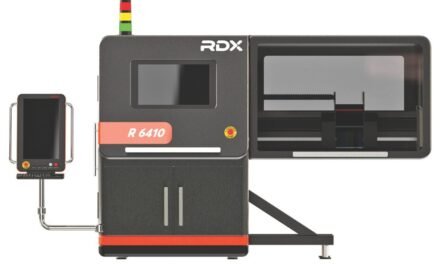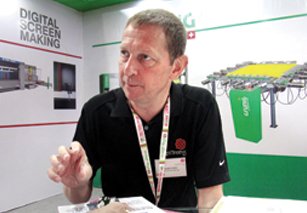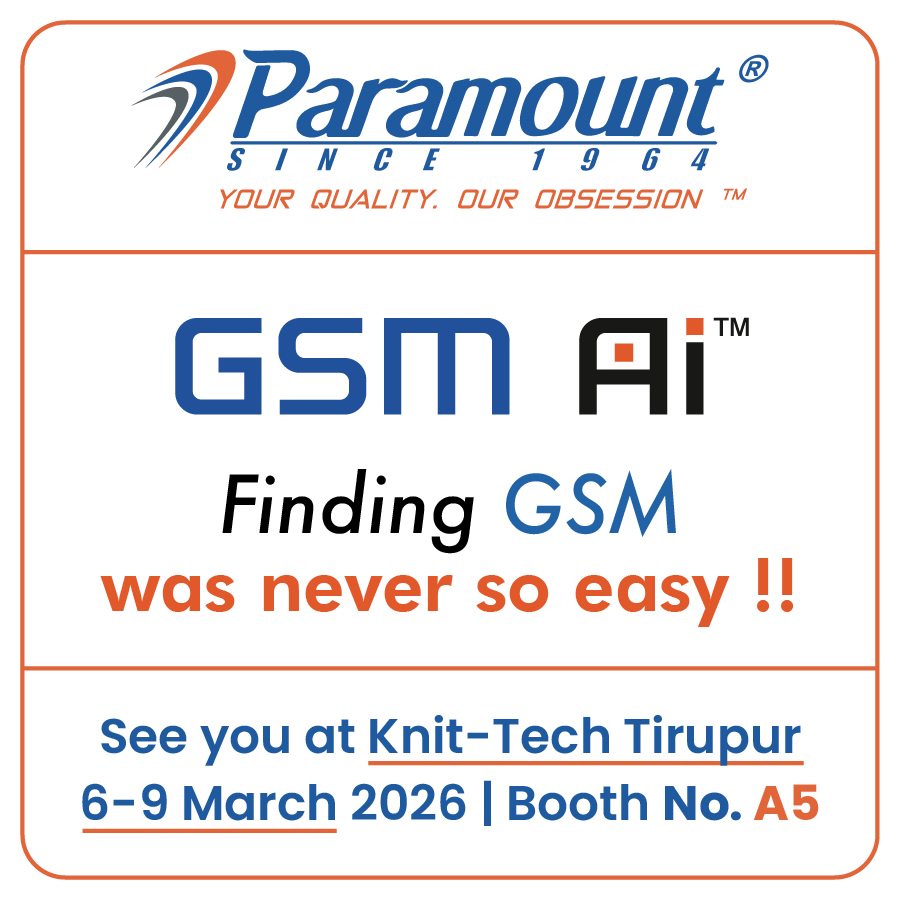With more than 100 years of activity the Santex Rimar Group has the experience to be innovative yet offer reliability, lower cost of production and environment friendly technologies. The group is a technology partner for knitted, woven fabrics, technical textiles, nonwovens and green solutions. To have a direct relationship with customers for fulfilling all their needs faster and better the company recently changed its business model and set-up Santex Rimar India office with new sales and service team. To know more about the recent change and its further plans for the Indian market, Knitting Views Editor Arvind Kumar met and interviewed Stefano Gallucci, Group CEO, Santex Rimar Group during his recent visit to India.
How has been your experience of working with the Indian market?
As a group we had very good experience in India. The main characteristic of the apparel and textile industry here is that they are early adopter of new machines and like to experiment. They even asked to use the prototypes of our machines centers for trial, which
is peculiar thing because usually the customers want much consolidated machines. We provide them most efficient technology in respect to productivity, energy savings and sustainability, low maintenance costs and state-of-the-art production processes. Nowadays, the customers in India are moving towards everything which is eco-friendly, and this is the reason why they are coming exclusively to us. Sustainability and eco-friendly are key issues for Santex. We have already installed more than 4,000 machines all over India and we want to keep growing together with our customers. We want to be sound, nimble and responsive at the same time.
Compared to previous years, which segment do you think is growing much in Indian market?
We have seen a lot of interest for technical textiles, so this is the segment where we are expecting to grow. There are several questions about how to improve productivity, so customers are coming to know more about advantages of using our machines in these processes. Besides, denim is another growing sector in India for which we can provide quality solutions.
The major problem here is that customers need to understand how to improve their production processes. That is why we are investing more in the Indian market. We historically had the site here in India with sales and service team. Now, we are hiring new people, new talents which are experienced and can also help in improving the machines. India is special in another way because entrepreneurs here know how to do things very well but we are giving them view of trends in rest of the world.
What was the reason behind having more people? What are your plans for the Indian market in coming few years?
Indian apparel & textile and technical textile markets are projected to grow at a CAGR respectively of 9 per cent and 8 per cent from 2013 to 2023. In this scenario customers need to have a direct relationship with us and we want to fulfill all their needs faster and better. So, that is why we are recruiting experienced talents who can be new proud group members looking forward to enhancing customer relation.
We are investing in very good sales people who are not like consultants but know what they are talking about. They can engage our product specialist all over the world; not only Europe but our specialist site in China, Italy, Switzerland, and many more coming up. Besides, we will be investing more in providing improved service also. Production is the key here, so you need to get good set of machines and spare parts fast.
What will be the responsibility of your new team in India?
Being close to local markets and employing local manpower allows us to be competitive and to offer our heritage of craftsmanship to global trade. We are capable of adapting to different cultures and languages as our knowhow enables us to understand and fulfill the needs of our global customers to whom we offer not only high quality machines but also good and punctual after-sales services.
Productivity, quality, reliability and energy saving are key values for Santex Rimar Group. The new sales and service organisation in India is directly taking care of not only of customers’ needs but also of their future developments. In India our facilities are based in Coimbatore and Mumbai. Since Research and Development is at the heart of our growth, our group is also in close contact with different institutes where researchers and students are trained: Technical textile technology is taught in Surat on Cavitec’s plant while weaving technology is practiced in Ichalkaranji on SMIT looms.
Which are the product solutions you are offering to the customers?
Our group is a technology partner for knitted, woven fabrics, technical textiles, nonwovens and green solutions: Cavitec and Isotex lead the technical textiles machinery market; Santex and Sperotto Rimar produce machines for textile finishing; Solwa provides eco-friendly machinery for water treatment, food dehydration, agribusiness sector and industrial waste management. With the entrance of SMIT, our group has become a solution provider also in the weaving sector.
 What was the reason behind adding SMIT weaving machines to your portfolio?
What was the reason behind adding SMIT weaving machines to your portfolio?
SMIT fit’s in our vision of a single point of reference for our customers. Santex Rimar has now knowledge and potential to help the customer’s strategy from the loom to the last finishing station, both in textile finishing and technical textile. It is one of the acknowledged brands, with edge technology very close to customers’ specific needs. Our customers will have incredible benefits from the synergy of our brands with SMIT and the integration of activities such as R&D, corporate activities and partnerships with strategic key players are only some of them.
Besides, SMIT was so advanced in products development that its current technology is still better than the competitors’. This is what today customers tell us. Nevertheless we have launched new developments and new research projects to define a new product roadmap. Some of these have been launched together with customers, in the tradition of SMIT and Santex Rimar. We are engaging universities and research institutions to make basic research and are looking at new technologies to integrate the looms in Santex Rimar vision of the industry.
Do you have or planning to have manufacturing facilities here in India?
Currently, we are present in Italy, Switzerland, China and India and have more than 30,000 customers throughout the world. We don’t have manufacturing facilities here in India. For us the point is not to make a low cost machine but to make a very good quality technology. We can make machines every where but for that we need to hire skilled people locally. We have been investing in excellence center so that we could learn together with our customers.
Today, we are the machine manufacturing and technology partners for customised solutions. We can group the machines for your specific products here. Those are the kinds of investments we would like to do. Making another factory doesn’t make any sense at the moment: the main focus is maintaining the quality.
Customers want to have a very good machine and that’s what we are doing; making quality machines and having very good people to set the process. Our group is made of many companies, who kind of get the heritage of what they are doing. This research is always been in DNA of this group. The second part of our name Rimar means research, so what we need to do is to active search wherever its best. In India you have very good minds with great tradition of textiles.
Is India going to be very big market for you in future?
Our Group is present in various countries with four factories, and customers based in almost 150 countries throughout the world to whom we offer specific solutions and services in order to become their reference point of excellence. India had always been in our top three markets historically. During 2015 and 2016 the Indian economy delivered a healthy growth of 7.5 per cent with promise of increasing momentum for the following years. Home textile market will have 8 per cent CAGR growth in the next decade. It is expected that technical textile market will have 8 per cent and textile & apparel exports by 9 per cent CAGR growth in the next decade. So, all this makes it a very potential market. Till today we have installed 4,000 machines here.With our own sales and service organisation, we will now be taking care in a direct and confidential way of customers’ needs and future developments.
What as an international company you think is a hindrance in terms of business here?
For the entrepreneurs here the problem is not having easier access of funding, which they usually tell us. We too help them sometimes by finding few international agencies that could fund them. It is a part of our world where we search for funding for technologies we supply, but for them it’s a problem. Though not for the big players but the medium and small size entrepreneurs’ access to credit is a major issue. So, if you want to grow you need to provide the raw material called money to the industry here.
What’s your message to the Indian customers?
As a group investing so much in new technologies, I would like to suggest to the Indian entrepreneurs to really look to grow in quality of production. To look at the local market which is always demanding for higher quality but to keep on investing on the other markets also. Higher quality doesn’t mean immediately higher revenues. So, you need to be efficient, with productivity and sustainability, it’s a journey and things don’t change in one day. You need long term planning which also comprises investments but there is no immediate return. There you need big partners basically solid partners who can give you view of what’s going on in the rest of the world, and there we can help. Going for quality machines should be their prime motive.



 What was the reason behind adding SMIT weaving machines to your portfolio?
What was the reason behind adding SMIT weaving machines to your portfolio?



















